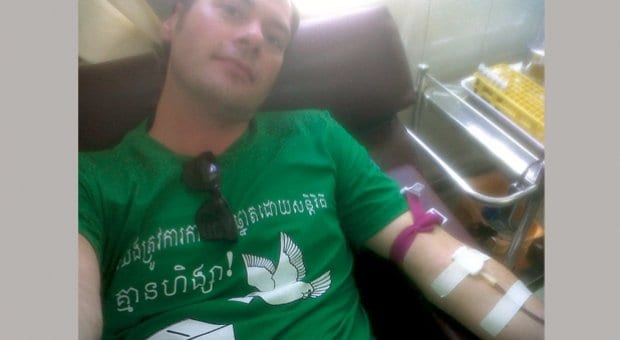Today I saved a boy’s life. At least, that’s what I was told after I left the blood bank’s transfusion room. I laughed, thinking it was a nice metaphorical pat on the back after watching 350 millilitres of blood slowly drain from my body.
But then I found out that I literally had saved a young boy’s life — simply because I decided to donate in the right place at the right time.
One of my colleagues had asked me to join her at a local blood bank, run by an Australian charity that channels blood specifically to children with thalassemia, a disorder that creates fatal iron levels in the blood and causes infection, bone deformation, enlargement of the spleen, anemia and heart problems.
In many places, a bone-marrow transplant is the most promising cure. However, in Cambodia, where the health infrastructure is ridiculously under-resourced, that option just doesn’t exist. The rich might be able to afford healthcare in Thailand, but the poor are often left to die, literally.
I’m not going to lie; I didn’t really intend to donate blood that day. When my colleague approached me, the first thing I asked was “What am I going to do after they interview me and reject my blood?”
In my own “progressive” country, I have been banned from giving blood. Earlier this year, Canada added insult to injury by lifting the ban on gay men giving blood — as long as we’ve abstained for the last five years.
So we can get married and live equal lives under the law, and, as long as we don’t have sex with our spouses, we can have the privilege of giving blood to save lives.
So much for an evidence-based policy that doesn’t buy into simplistic, discriminatory stereotypes of high-risk groups. I can’t deny that I carry some baggage about blood donation and the organ donor industry.
My goodhearted and persistent colleague took my concerns and went up the information ladder to get answers.
In Cambodia, you are asked specifically whether you have had a new sexual partner in the last six months and, if so, whether you have had unprotected sex with that person.
That’s it. No questions about your partner’s gender; no assumptions about high-risk groups or reinforced stereotypes for the sake of (ineffective) screening.
As I leaned back in the donor chair and watched my blood drain slowly through the tube, I thought about how years of having my blood rejected had left me detached from the experience of potentially saving a life.
When I left the donor room, a man suddenly dragged me into the kitchen. He didn’t say anything to me, just pointed and offered me food. I assumed it was his job. I sat down to replenish myself with bananas, an egg and some water. As I ate, my colleague filled me in on what had transpired while I was giving blood.
A man who works for the hospital running blood between facilities had arrived at the blood bank with a mother desperately seeking blood for her son. Suffering from thalassemia, the boy was at the stage of splenomegaly, where the spleen literally expands like a balloon in the chest.
In Cambodia, to access blood for a surgery, you must be able to replace it beforehand. The mother, who needed to provide two units, was not able to get enough blood into the bank for the required transfusion. Blood as a currency might not happen so bluntly elsewhere, but blood-bank reserves certainly are an issue everywhere.
The Australian charity was able to sign over my blood on the spot for the boy who needed emergency surgery immediately.
As I sat in the kitchen, the mother and blood runner came in, bowing to me and thanking me profusely for giving them the unit they so desperately needed for her son.
It took a while for the impact of my action to really sink in.
I now have a big bag of instant noodles and a can of condensed milk — given to me by a visibly poor family — that speak of more gratitude than I’ve ever received.
I’m so humbled by this experience. I have never felt so connected to a donation before in my life.
Please give blood. Please fight for the opportunity for everyone to give blood. On July 18, I saved a boy’s life in Cambodia simply because I was in the right place at the right time, and because my blood was welcome.
Raymond Hyma is a Vancouverite working in a Cambodian civil-society project through Cuso International, a Canadian international development organization. His work aims to strengthen the voices of rural and marginalized populations, to encourage inclusive participation and influence policy during current government reforms.

 Why you can trust Xtra
Why you can trust Xtra


